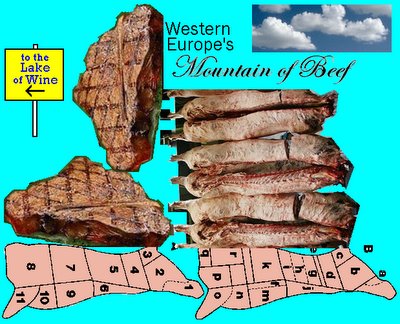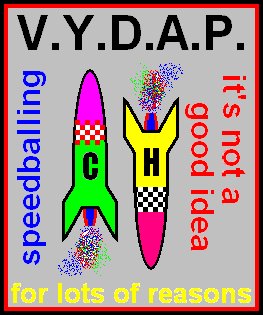Well, this really blows dead rats. It's Mozart's 250th Birthday Year, and Deutsche Oper is cancelling "Idomeneo" scheduled for November.
There is worse classical music news. In the United States, shopping malls that were having trouble with hordes of unsupervised teenage mischief-makers found that piping classical music -- Mozart, J.S. Bach -- through the mall speakers is a very effective Youth Repellent, the Youth don't want to hang at the shopping mall anymore, the horrible geezer music is just too icky, the mall just isn't fun anymore.
But this really blows dead rats. I'm out of here. I'm hopping the Zeta Beam to Planet Vleeptron for a few days. The Dwingeloo Galactic Opera is putting on Alban Berg Week, "Lulu" and "Wozzeck" back to back.
No one could possibly object to that.
Meanwhile, lots of people never make it to the last paragraphs of a news story, they figure the story said all the important stuff in the first few grafs. So in case you're feeling weary and may not make it to Das Ende, here's a little bonbon from the penultimate paragraph:
Berlin was one of the few cities to vote against Hitler in 1933
Something to think about when you're planning a Euro trip. I sure had a metric shitload of fun there. Stayed at The Savoy. So did Thomas Mann!
"Wir suchten schon unser vertrautes Savoy Hotel in der Fasanenstrasse auf. Ein kleines Hotel ..., aber so sympathisch und behaglich." -- Thomas Mann
A deutsches production of Weil's "One Touch of Venus" was playing across the Strasse. I wouldn't have missed that place for anything.
So no posts for a few Earth Days. While I'm in Another Galaxy, please Leave A Comment. About anything.
~ ~ ~
International Herald Tribune (Paris)
Tuesday 26 September 2006
Berlin opera canceled
after religious threats
by Judy Dempsey, International Herald Tribune
BERLIN -- Fearing religiously motivated attacks, one of Germany's most prestigious opera houses on Tuesday canceled all further performances of Mozart's "Idomeneo," citing "incalculable risks" to the public after receiving anonymous threats.
The cancellations by the Deutsche Oper, affecting four scheduled performances in November, dealt a blow to Berlin's long tradition of artistic freedom, and were roundly criticized by top government officials.
The opera is about Poseidon, the Greek god of the sea, who exacts a cruel allegiance. But in this production, by the noted director Hans Neuenfels, one of the last scenes shows the protagonist presenting the severed heads of several religious figures: not only Poseidon, but also Jesus, Buddha and Muhammad.
"Neuenfels is a secularist who does not believe religion solves the problems of the world," said André Kraft, a spokesman for the Komische Oper, a more innovative opera house, where Neuenfels is engaged in another Mozart production.
The decision provoked a barrage of criticism from Chancellor Angela Merkel's governing coalition of conservatives and Social Democrats. It accused the opera house, opened in 1912, of bowing to intimidation at the expense of defending cultural expression.
But the Deutsche Oper's general manager, Kirsten Harms, said her main concern was "the safety of the public and the safety of the performers."
"I received information in August that there had been an anonymous threat," Harms said at a packed and often acrimonious press conference in the foyer of the Deutsche Oper.
Harms, who was appointed in 2004 after directing a less-well-known opera house in the northern port city of Kiel, said the Berlin police had made an assessment about the threats and then informed the city government's interior office.
"It would have been an incalculable risk for the public and employees if Deutsche Oper went ahead with 'Idomeneo,'" Harms said.
But leading politicians skewered her decision, some saying it was laughable, others saying it was giving in to religious fanatics.
The German interior minister, Wolfgang Schäuble, who has taken a hard line on terrorism but at the same time is leading attempts to integrate Germany's largest Muslim communities, said the decision was "mad" and "unacceptable." He spoke to reporters in Washington, where he was holding security talks with his U.S. counterparts.
Schäuble, who was responsible for organizing security during the World Cup this past summer in Germany, is conducting an Islamic conference in Berlin on Wednesday, as part of the government's strategy to start a dialogue with a community that comprises 3.2 million of Germany's 81 million people.
Wolfgang Börnsen, culture spokesman for Merkel's conservative bloc in the Bundestag, Germany's lower house of Parliament, accused the Deutsche Oper of "falling on its knees before the terrorists." The cancellation, he said, "damages the freedom of art if you stop a production that is critical of religion out of fear of the possibility of a terrorist attack."
Ekin Deligöz, a leading member of the opposition Greens Party, also lashed at the decision.
"We are talking about music, about opera," said Deligöz, a Muslim. "It shows they don't trust the immigrants who have nothing to do with terrorism. There is a generation of immigrants who are open, who do not like fundamentalism."
Harms repeatedly declined during the 50-minute news conference to say which religious group had threatened the storied Berlin opera house.
Instead, she referred to the official Deutsche Oper statement, which said that "some scenes of 'Idomeneo,' which addressed Islam alongside the other great world religions, presently constitute an incalculable threat to the opera house." It did not go into detail.
Asked whether "Idomeneo" would be permanently off the program at the Deutsche Oper, Harms said: "No. It will remain on the program. We will perform it later."
Asked whether the same production would be performed, she hedged: "We will use the same director."
Harms did say that she had to consider the political and diplomatic aspects of "this complex issue."
Harms was asked whether her decision had been influenced by the controversy and subsequent riots by Muslims against the publication of cartoons early in the year showing the Prophet Muhammad wearing a headdress packed with explosives, or more recently the remarks by the German-born pope, Benedict XVI, about Islam that sparked anger in the Muslim world.
She replied curtly, "I already explained the security concerns."
Rolf Bolwin, director of the Association of the German Stage, an umbrella organization for opera and theater, said that it was "a very difficult situation."
"We have had the experience of the pope's speech and the Danish cartoon," Bolwin said. "The issue is how concrete was the danger for Deutsche Oper."
The Deutsche Oper had been a beacon for opera lovers, particularly during the Cold War years. During that time, the then-West German federal authorities lavishly subsidized the arts and made West Berlin a showcase, in contrast to the drab and gray eastern part.
The Deutsche Oper, which then had a more traditional approach to staging operas, attracted prominent conductors like Karl Böhm and Lorin Maazel.
Berlin was one of the few cities to vote against Hitler in 1933, and during the Cold War, the arts flourished in the divided western half, thanks to generous subsidies from the federal government.
Since the reunification of the two Germanys 16 years ago, Berlin has become one of the most culturally lively and creative cities, despite its high unemployment and huge debts.
- 30 -






